 Leading Blog | Posts by Month |
 Leading Blog | Posts by Month |
11.28.08

Stimulus Package 1 - Free Book: The Truth About You Here’s a stimulus package to get you thinking. It’s a package designed to serve as a catalyst to help you to find ways to make things work and get things done. While you might think of it as a piece of good fortune, don’t think of it as a bailout. You’ve still got to do the inside work. Here’s a stimulus package to get you thinking. It’s a package designed to serve as a catalyst to help you to find ways to make things work and get things done. While you might think of it as a piece of good fortune, don’t think of it as a bailout. You’ve still got to do the inside work.
In partnership with Thomas Nelson Publishers, we are giving away five copies of The Truth About You by Marcus Buckingham. The Truth About You focuses on how you set your career up right—how do you start in such a way that you can push the world toward the best of you; learning to express the best of who you are. It incorporates a candid 20-minute enhanced DVD (a reworking of the effective Trombone Player Wanted film); an interactive book, which takes up where the film leaves off; and a reMemo Pad, a way of using the raw material of your week to clearly identify your strengths and weaknesses. It’s a great gift for any young person to help clarify their direction and find meaning in life. For a chance to get a copy, leave a comment on this post and we will randomly select five recipients on Friday, December 5, 2008. Related Interest: UPDATE: Five respondents have been chosen at random. Thanks for participating.
Posted by Michael McKinney at 08:05 AM
11.27.08

Out of Context: You’re Biggest Competitor is Your Own View of Your Future"You have to compete in the future dimension without destabilizing competition in the present and without subverting the core values that have sustained your business in the past. That’s part of doing business in the three dimensions of time. The only way to succeed in the marketplace today—the marketplace of individuals or products or services or ideas—is to know your own story and to follow it into the future. Define yourself by someone else’s benchmarks, immerse yourself in someone else’s possibilities, and you become the thing you define yourself by and immerse yourself in. Measure yourself against your own rate of change and you stay inside your own story. That way, when the other side ceases to exist, you still have a reason to go on. External and lateral competition is the distraction. Internal and vertical competition is the game. The real battle is against yourself. Look at competition as external and lateral, and you also can never stop defining yourself by the present moment. Do that and you can never escape from the present into the future. Fail to make that leap, and the changes you are required to make will always be reactive and degrading." —Watts Wacker and Jim Taylor,
The Visionary’s Handbook: Nine Paradoxes That Will Shape the Future of Your Business
Posted by Michael McKinney at 08:49 AM
11.26.08

I Hired Your Resume. But Unfortunately What I Got Was You!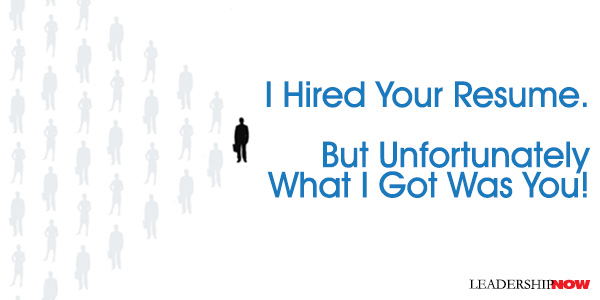
THE Wall Street Journal recently asked 100 CEOs of large companies what their top priorities were. After the obvious financial issues, the perennial concern over finding the right people to do what needs to get done was the issue of the day. This speaks to a larger problem of education, but makes all the more important the solutions presented in Who: The A Method for Hiring by Geoff Smart and Randy Street. Smart and Street have set out to help you make better who decisions. Often the problem is getting past the resume and really getting to know the person you are considering. Most managers fail at hiring because they do not follow a rigorous hiring process. Who lays out a four step process that, in my experience, may need to be adapted depending on the type of position you are trying to fill. But the principles are valid across the board. If the book does nothing else, it will help you rethink what you are now doing and avoid what they call voodoo hiring practices – playing (mind) games with the candidates, trying to size people up after one conversation, and questions designed to trick or are that are irrelevant. The bottom line is that you can’t “read” people like you think you can. “It’s hard to see people for who they really are.”The four steps they recommend are: Scorecard: The scorecard is a blueprint for the role you have to fill. Most companies would improve their odds if they just got this step right. The last job description you have on file is probably not precise or accurate enough to get you the right person for the job. You have to set clear objectives for your hiring process to know exactly what kind of candidate you need to hire. They say that hiring the “all-around athlete” is not as successful as the specialist – someone hired to a specific role that you need filled. Sourcing: The question they get asked over and over is “Where do you find talented people?” The number one and best source is from your professional and personal networks. But if you wait until you are ready to hire, it’s probably too late. “Successful executives don’t allow recruiting to become a one-time event, or something they have to do every now and then. They are always sourcing, always on the lookout for new talent, always identifying the who before a new hire is really needed.” Select: Smart and Street recommend four distinct types of interviews: the screening interview, the Topgrading Interview, the focused interview, and the reference interview. You’re looking for patterns, “facts and data about somebody’s performance track record that spans decades.” Sell: Once you decide on a candidate you need to get them on board. Be sure to position your company as a place good people want to work. Care about what they care about: how they fit in, their family, freedom, compensation, and fun (the work environment). 
Posted by Michael McKinney at 03:03 PM
11.22.08

Lunch with the FT: Tom Peters In the weekend edition of the Financial Times there is a great interview with Tom Peters by Stefan Stern. It’s candid and worth a read. Here’s a sample: Few have criticized what he does for a living as ferociously as Peters himself. “I say to people, ‘You got a bad deal, paying money to see me,’” he tells me. “I have utterly nothing new to say. I am simply going to remind you of what you’ve known since the age of 22 and in the heat of battle, you forgot. You’d have to be one of those television preachers to believe that you’re going to work with a group of 500 people and change their lives. First of all, most of them agree with you. You’re not going to pay £1,000 [a head] to go and see someone if you think the guy’s a jerk.Later, Stern writes: Fortified, I give him my best shot. Is management getting harder? “No,” he replies firmly – and in defiance of the conventional wisdom. But what about all that new technology, the end of deference, the increased pace of life, and the heightened expectations of employees? Doesn’t that all make management harder?You can find the quick, entertaining interview at the Financial Times: Lunch with the FT
Posted by Michael McKinney at 08:20 AM
11.21.08

8 Dangers Every Leader Must Face and Overcome Don Schmincke writes, "here, climbers resemble corporate professionals. They live passionately while confronting impossible odds. Some are deeply humble while others are psychotic narcissists. They come with all levels of competence; from naive wannabes to elite athletes. And when put to the test, climbers react like professionals: sometimes heroically, other times self-destructively." Don Schmincke chose this environment to answer the question, when it comes to job, career, or personal success, why do some professionals excel while others flounder even with the same methods? To study those who lead teams in the riskiest and most extremely challenging situations encountered in death zone environments, he tuned to mountaineering expedition leader and founder of Earth Treks, Chris Warner. In High Altitude Leadership, Don Schmincke and Chris Warner offer lessons from the death zone that any leader can use to achieve something much higher than they currently feel possible. Where people can die or business can fail, high altitude leadership—people who produce peak performance in the face of extreme challenges—is needed. Leadership is a sweet delusion: so fragile, so easily sabotaged. Whether on a mountain or at work, leading others can quickly become difficult and dangerous. You want badly to influence positive change in your organization. You accept the title of leadership and purposefully trek upward, propelled by hope. In this exciting journey, you seek to be a great leader leading a great company to great altitudes.Schmincke and Warner have identified eight dangers that can sabotage anyone at some point in their journey and put at risk careers, projects, or even companies. Overcoming these dangers requires implementing specific survival tips that are outlined below:
Here at sea level, these dangers don’t seem to pose a very big threat. But it’s deceptive. We figure we can get by. At sea level the margin for error is greater and the consequences often take longer to be realized. In the end, they will destroy you just the same.
Posted by Michael McKinney at 12:45 PM
11.18.08

The Secrets of the Millennial Generation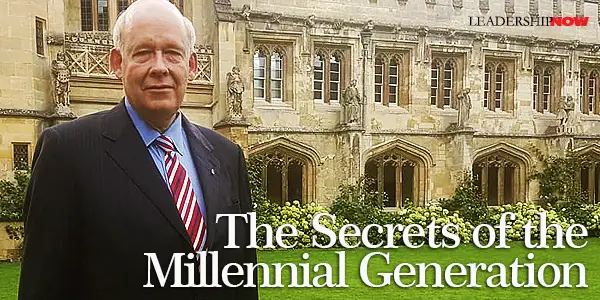
Talking Management is a weekly videocast that McGill University’s Karl Moore hosts for Canada’s Globe and Mail newspaper. Recently he recorded a presentation on how to manage and lead today’s youth. The Business Strategy Review, published by the London Business School, identified Moore among a group of world’s greatest business thinkers. In this 20 minute video, he provides not only some practical ideas but an understanding of the context that produced the Millennial generation. Here are some excerpts: The job of the manager is not to have the ideas but to support them. That is saying that innovation comes from everywhere, not just from the center, not just from the top of the pyramid, not just from the old people, it comes from throughout the organization. This fits with the business need. A manager, a leader must now spend more time listening and looking for others' ideas and empowering them than in merely trying to be the great strategist. We have heard this for a while but I think that it seems more compelling today than in the past. It is just more true. It used to be that global firms would have a head office in a country and that is where ideas would come from but probably the main advantage of being a global multinational organization is that you are getting ideas and innovation from all over the World rather than from one place.You can also read a transcript of the video on the Globe and Mail web site.
Posted by Michael McKinney at 12:32 PM
11.14.08

Hiring the Right Skill Set and Motivating the Millennials
IN RAISING and schooling our children in the U.S., it appears we have dropped our standards. And it shows. Finding the right people is becoming a more and more difficult proposition. (I enjoyed reading about Linda Zdanowicz's search for a dental assistant on her blog.) Tony Wagner, author of the The Global Achievement Gap has written an important book that should not be ignored by business leaders. It sets a meaningful agenda for a good dialogue between educators and business leaders and concerned parents about our educational system. Wagner has written the following for us: In an economic downturn, employers need to be even more careful with their hiring decisions. And recent graduates from some of the best schools may not have the skills that matter most in the new global knowledge economy. In researching my book, The Global Achievement Gap: Why Even Our Best Schools Don’t Teach The New Survival Skills Our Children Need -- and What We Can Do About It, I have come to understand that there are "7 Survival Skills" for the New World of Work, and that employers must look beyond applicants' "pedigrees" to carefully assess whether they have the skills that matter most. New Skills Here are the Seven Survival Skills, as described by some of the people whom I interviewed: • Critical Thinking and Problem Solving "The idea that a company's senior leaders have all the answers and can solve problems by themselves has gone completely by the wayside . . . The person who's close to the work has to have strong analytic skills. You have to be rigorous: test your assumptions, don't take things at face value, don't go in with preconceived ideas that you're trying to prove." —Ellen Kumata, consultant to Fortune 200 companies
• Collaboration Across Networks and Leading by Influence "The biggest problem we have in the company as a whole is finding people capable of exerting leadership across the board . . . Our mantra is that you lead by influence, rather than authority." —Mark Chandler, Senior Vice President and General Counsel at Cisco
• Agility and Adaptability "I've been here four years, and we've done fundamental reorganization every year because of changes in the business . . . I can guarantee the job I hire someone to do will change or may not exist in the future, so this is why adaptability and learning skills are more important than technical skills." —Clay Parker, President of Chemical Management Division of BOC Edwards
• Initiative and Entrepreneurship "For our production and crafts staff, the hourly workers, we need self-directed people . . . who can find creative solutions to some very tough, challenging problems." —Mark Maddox, Human Resources Manager at Unilever Foods North America
• Effective Oral and Written Communication "The biggest skill people are missing is the ability to communicate: both written and oral presentations. It's a huge problem for us." —Annmarie Neal, Vice President for Talent Management at Cisco Systems
• Accessing and Analyzing Information "There is so much information available that it is almost too much, and if people aren't prepared to process the information effectively, it almost freezes them in their steps." —Mike Summers, Vice President for Global Talent Management at Dell
• Curiosity and Imagination "Our old idea is that work is defined by employers and that employees have to do whatever the employer wants . . . but actually, you would like him to come up with an interpretation that you like -- he's adding something personal -- a creative element." —Michael Jung, Senior Consultant at McKinsey and Company
Looking Beyond the Degree The conventional thinking of many who make hiring decisions is that graduates from "name-brand" colleges are likely to be more intelligent and better prepared than students who have gone to second or third tier schools. But, in reality, what the degree may mean is that these students are better at taking tests and figuring out what the professor wants -- skills that won't get them very far in the workplace today. A senior associate from a major consulting firm told me that recent hires from Ivy League business schools were constantly asking what the right answer was -- in order words, how to get an "A" for the job they were doing -- and were not always very adept at asking the right questions, which was the single most important skill senior executives whom I interviewed identified. So what does this mean for the interview process? First, listen carefully for the kinds of questions the applicant asks. Are they probing? Insightful? Do they suggest that the applicant has really prepared for the interview by trying to understand your business? Do you feel as though you or your company are being interviewed? If so, that's a very good sign. How a prospective employee asks these questions matters, as well. Does he or she listen carefully and engage you in discussions? Is the potential new hire both interested and interesting? In addition to the ability to ask good questions, senior execs told me that the ability to "look someone in the eye and engage in a thoughtful discussion" is an essential competency for working with colleagues and understanding customers' needs. Finally, perhaps the most important question you might ask is, "what do you want to learn or how do you want to grow in this job?" This question is essential for two reasons: First, the quality of the answer will tell you how reflective this individual is -- and how intentional he or she may about his or her own development. More than any specific skill, individuals must want to learn, grow, and improve continuously to be successful in today's workplace. Motivating the Millennials The second reason why this question is important goes to the heart of the problem of how to motivate new hires to do their best. In asking the question, "how do you want to grow," you are signaling to a prospective employee that you and your company are committed to developing the talents of your workers. Many employers worry that this generation lacks a work ethic. But in my research, I have discovered that this generation is not unmotivated but rather differently motivated to learn and to work. Above all else, they want opportunities to be challenged and to make a difference. Describing the different work ethic of this generation, Ellen Kumata, who is a managing partner at Cambria Associates and consults to senior executives at Fortune 200 companies, told me, "They don't see coming into a company as being a career experience. They don't want to climb the corporate ladder and make more money and please the boss. And so you can't manage them the same way -- you can't just put them into a cubicle and expect them to perform." Tracy Mitrano, who manages the Office of Information Technologies at Cornell University, agreed: "You have to make the work more interesting and allow them to work in different ways. They are prepared to work just as much and just as hard -- but not at a desk 8 hours a day." Andrew Bruck was finishing a law degree at Stanford when I interviewed him last year. "We want to feel ownership. We have a craving for an opportunity to do something really important," he told me. "People in my generation have been in a constant state of training. Now they're excited to go do something. The more responsibility you give people, the better they produce . . . There are more and more recent law school grads who are willing to take a lower salary in return for an opportunity for more meaningful work." Ben McNeely, a journalist, described to me the difference between his former employer and his current one. "At the paper where I worked previously, the publisher would kill stories if they portrayed an advertiser in a negative light. At the paper where I work now, I have an opportunity to contribute something in a growing community. I was brought in to cover the new bio-tech research campus under construction nearby, where the Canon towel factory used to be, and to cover health care issues, as well. I have support from the editor and publisher who both have strong journalistic ethics. I like it that the editor pushes Windham, who us to dig deeper." Carie Windham, who graduated from college in 2005, told me about the best boss she's ever had. "He asked me where I want to be in 10 years. He talked to me about creating the experience I want to have. He understood I wouldn't be there forever . . . Mentoring is a huge motivational tool, someone showing an interest in you and giving you feedback. We want to feel we have a creative, individual role -- that we're not just working on an assembly line. We want to feel like we have ownership of an idea." Hiring the right talent, then, is only part of the problem employers face today. Equally important is how businesses create challenges and learning opportunities that motivate the Millennials to do their best. Google, which had more than one million applications for 5,000 jobs in 2006, is the number one pick of a place to work for many of the Millennials. Listening to twenty-two-year-old Matt Kulick talk about his work, one begins to understand how profoundly many companies will have to change in order to attract and retain the best talent: "First, they (Google) share ideals that I believe in—open source software. And their products are solving important problems for people—doing good in the world. I believe in what they're doing—these values are very important to me. I wanted to help out, to make a contribution. The second reason I came to Google is because they give me the resources I need to accomplish major things that will really make a difference in the world. The third reason is the responsibility they give you from the day you start. It is a winning combination. It makes me happy to go to work every day."  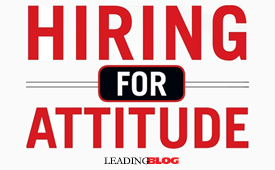 
Posted by Michael McKinney at 06:07 AM
11.13.08

Out of Context: A World in Search of Leaders"We have also learned a great deal about the limitations and shortcomings of our financial system and about the frailties of the people running and abusing it. We must make sure that these lessons are put to good effect. The world will not be a hopeless mess as long as it is in a learning curve....There's one lesson to be learned above all others: There is no substitute for prudent, strong and courageous leadership. This is what the civilized world currently lacks and must find--soon." —Paul Johnson, eminent British historian and author,
"A World in Search of Leaders" in Forbes November 24, 2008
Posted by Michael McKinney at 03:15 AM
11.11.08

The Wisdom of the Flying Pig FREE Download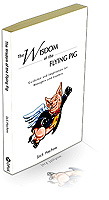 Following our review of Jack Hayhow's The Wisdom of the Flying Pig, he is graciously making a copy of the eBook available free to readers of this blog for a limited time. To take advantage of this free offer: Following our review of Jack Hayhow's The Wisdom of the Flying Pig, he is graciously making a copy of the eBook available free to readers of this blog for a limited time. To take advantage of this free offer:
1. Go to Jack Hayhow’s website 2. Click “Add to Cart” button at the top of the page 3. Enter Discount Code: L8N1B 4. Fill out a short informational form and then the eBook will be emailed to you. This offer is now over, but copies are available in paperback and on Kindle.
Posted by Michael McKinney at 09:11 AM
11.10.08

Not All Recognition Is EqualThe Wisdom of the Flying Pig It is the great merit of Hayhow to remind readers of timeless principles for building relationships and getting work done through people. He reminds us, “No one responds well to manipulation—no matter how cleverly or skillfully the manipulation is done.” The first principle of effective recognition: Provide recognition in an honest and authentic way.What are you doing to find what's right in people?
Posted by Michael McKinney at 08:25 AM
11.07.08

Outliers: Understanding the Context of Success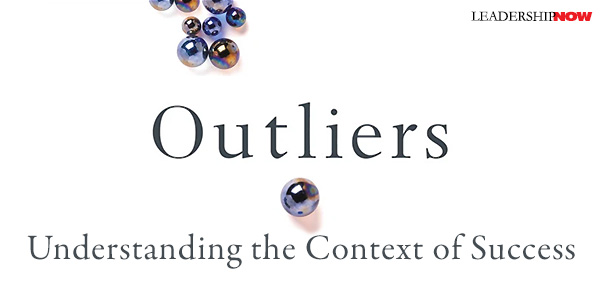
A LOT has been written of late about superior performance that often sets conventional thinking on its head. We often assume genius and success is the result of natural gifts and if you don’t have it, then you don’t have it. But research is demonstrating that great performance is more about what we do after we are born than we ever thought. People don’t rise from nothing. In his new book Outliers (men and women who do things out of the ordinary), Malcolm Gladwell writes:We pretend that success is exclusively a matter of individual merit. But there’s nothing in any of the histories we’ve looked at so far to suggest things are that simple. These are stories, instead, about people who were given a special opportunity to work really hard and seized it, and who happened to come of age at a time when that extraordinary effort was rewarded by the rest of society. Their success was not just of their own making. It was a product of the world in which they grew up.Gladwell provides countless stories and examples of successful people—Bill Joy, Bill Gates, the Beatles, Chris Langan and others—and draws interesting connections about their success. Successful people must be considered within the context of their culture and the people that surrounded them. “The values of the world we inhabit and the people we surround ourselves with have a profound effect on who we are.” The people who stand before kings may look like they did it all by themselves. But in fact they are invariably the beneficiaries of hidden advantages and extraordinary opportunities and cultural legacies that allow them to learn and work hard and make sense of the world in ways others cannot. If you look hard enough, there is a pattern of achievement. It’s a fascinating read. Related Interest:

Posted by Michael McKinney at 06:14 PM
11.04.08

Lead By Example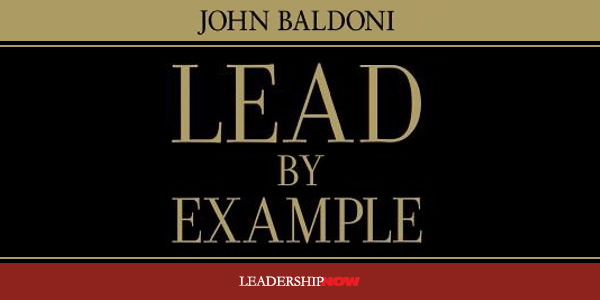
LEADING BY EXAMPLE is one of those things we know and remember to do on our way to do something else. The problem is that it requires a lot more inner work than we are willing to put in, but it leverages our leadership more than any other thing we can do. Unfortunately, it is the norm that leaders don’t know themselves well enough to set an example. Tolstoy once remarked, “Everyone dreams of changing humanity but no one dreams of changing himself.” Yet that’s what it takes to lead by example. John Baldoni has written an excellent and practical book that addresses areas that leaders need to look at in order to be the kind of person that people will want to follow. Lead by Example contains 50 short chapters that pinpoint an area of concern and how to tackle it. It “demonstrates how leaders leverage their best attributes to overcome their shortcomings in order to build trust and drive results.” Baldoni breaks up the 50 chapters into four sections that he describes this way: Set the Right Example
Act the Part
Handle the Tough Stuff
Put the Team First
The way this book is organized makes it a great reference tool that you can refer to when you are faced with leadership—people—issues. It’s also a good book to put in the hands of those who are seeking to lead in your organization. The thinking and behaviors addressed in this book will pay dividends. 
Posted by Michael McKinney at 10:23 AM
11.02.08

Leadership Books: November 2008Here's a look at some of the best leadership books to be released in November.




Posted by Michael McKinney at 12:39 PM
|
BUILD YOUR KNOWLEDGE


How to Do Your Start-Up Right STRAIGHT TALK FOR START-UPS 
Grow Your Leadership Skills NEW AND UPCOMING LEADERSHIP BOOKS 
Leadership Minute BITE-SIZE CONCEPTS YOU CAN CHEW ON 
Classic Leadership Books BOOKS TO READ BEFORE YOU LEAD |
|